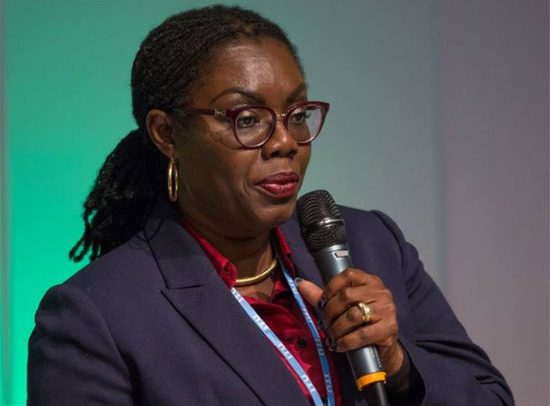Ursula Owusu-Ekuful
The controversial Kelni-GVG deal has brought Ministry of Communications on a collision course with the Bank of Ghana (BoG).
The two government agencies appear not to see eye to eye following the trading of harsh words over a recent request by the Communications Ministry to BoG to access information on the data of mobile money transactions of customers of telecommunication companies operating in the country.
According to the BoG, it cannot release information on mobile money data to Kelni-GVG, a company contracted by the National Communications Authority (NCA) and the Ghana Revenue Authority (GRA) to gather data on revenue by monitoring call information of telcos and determine appropriate revenues payable to government.
The BoG said the request by the Ministry to hand over such data would breach the confidentiality of customers and therefore could not be granted.
This did not go down well with the Communications Minister, Ursula Owusu-Ekuful, who sent a strongly worded letter to the BoG through her Special Assistant, virtually insulting the officials at the Central Bank.
The Communications Ministry, in a letter dated November 1, 2018, disclosed that “though we acknowledged receipt of the BoG’s letter on the subject matter, if the Bank of Ghana desires to communicate with the Minister for Communications on this or any other matter kindly let the Governor do so.”
The Communications Ministry missive, signed by Anastasia Marfo, aide to the minister, said: “The level of disrespect exhibited by the bank on this matter is simply appalling. We will disregard this letter and its contents. Have a good day.”
Genesis
The Ministry, in May 2018, demanded that telcos should allow Kelni GVG to access their systems to monitor call traffic as a way of ensuring that they declare accurate taxes.
This was after the NCA had signed controversial $178 million contract with Kelni-GVG to calculate taxes and government revenue.
The Communications Minister described the resistance from the telcos “completely unjustified, fanciful or smack of disrespect for our laws” after they expressed fears of privacy breaches in connecting to the system of Kelni GVG.
The ministry threatened to withdraw their operating licences if they failed to comply with the directive.
The Communications Ministry, in its earlier letter dated 25th October to BoG, called for disclosure of customer balances, transaction amounts, date and time of the transactions.
However, the Central Bank explained that handing over such data would breach the Guidelines of Electronic Money Issuers and the Data Protection Act.
“The bank’s attention has been drawn to an arrangement with Kelni GVG to monitor money transactions in Ghana. This involves the disclosure of customer information, including customer balances, transaction amounts, date and time of transactions.
It revealed that the provisions of the Guidelines of Electronic Money Issuers (2015) and the Data Protection Act 2012, Act 843, ensure customer privacy rights and that such arrangements would amount to a breach of the legislation.
“The bank recognises the need to continue to collaborate with regulations. However, this collaboration should not lead to a breach of financial regulation and data protection provisions.
“The oversight of mobile money operators, which are subsidiaries of telecommunication companies, falls under the purview of the Bank of Ghana.
“We, therefore, request that mobile money transactions which fall within the category of financial services should be exempted from the disclosure of such information,” the letter addressed to the Communications Minister and signed by Frances Van-Hein Sackey, Secretary to the BoG, said.
This led the minister to fire letter dated November 1, 2018, through her special assistant, saying that she won’t deal with anybody at the BoG but the Governor, indicating that the secretary to the bank was not her co-equal.
Background
Mobile money transactions hit GH¢109 billion by September last year, a 112 per cent jump from the September 2016 figure of GH¢51.4 billion.
In the first half of 2018 alone, mobile money transactions crossed ¢104 billion.
Government is suspicious of the amounts declared as taxes by the telcos, hence its resolve to employ the services of Kelni GVG to monitor their data.
By Samuel Boadi


